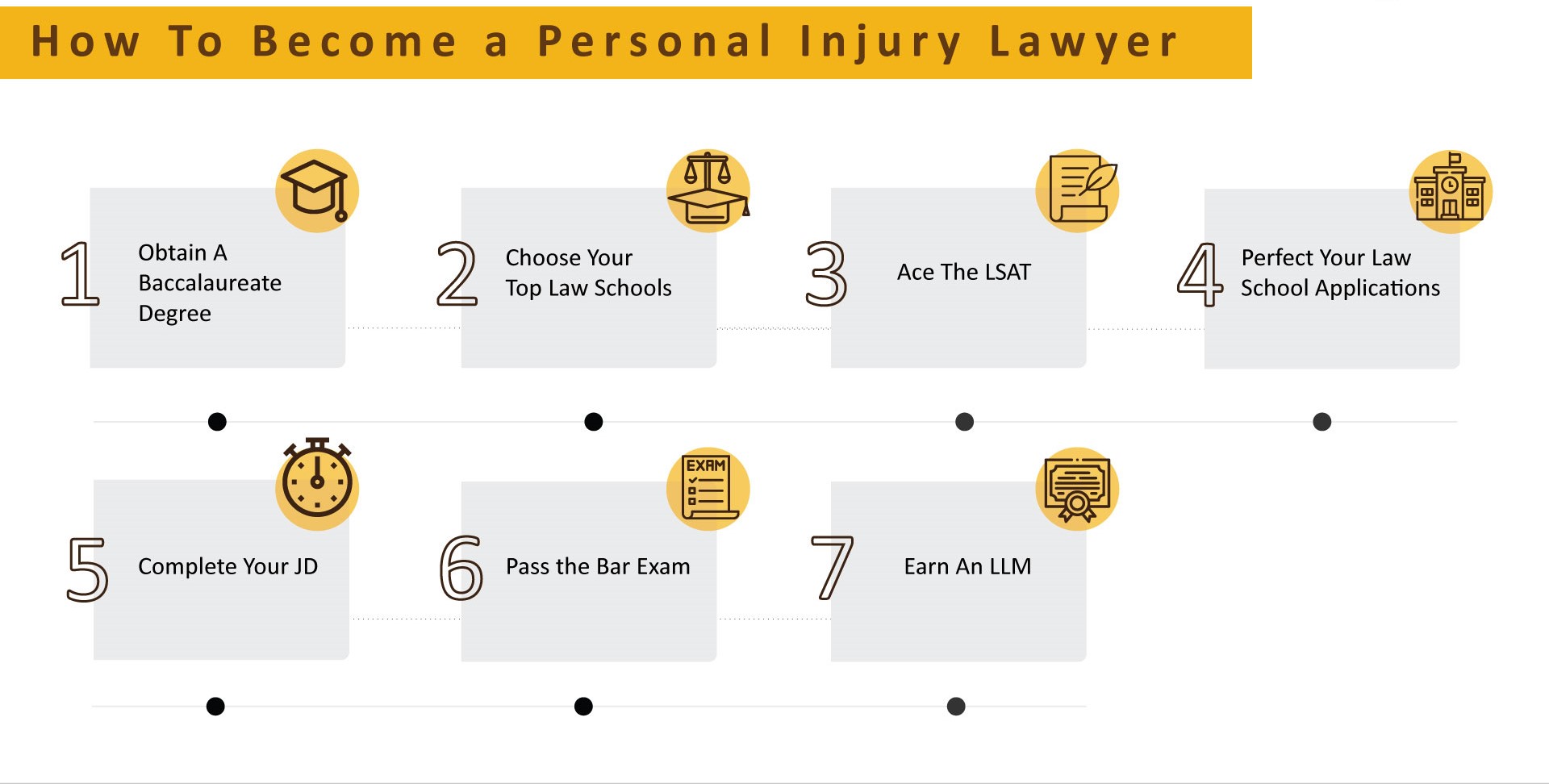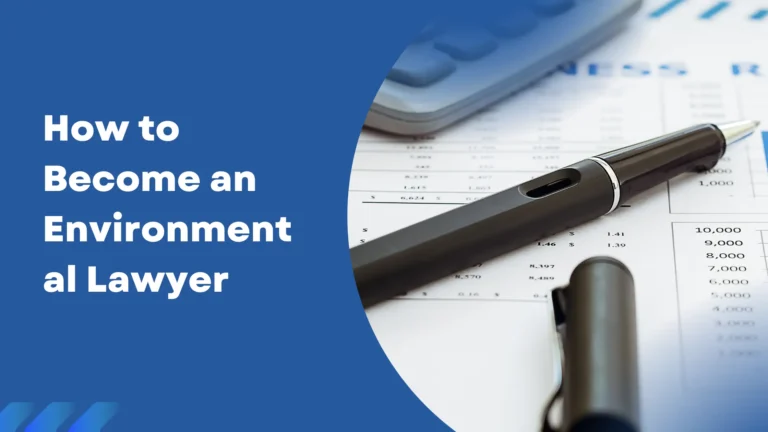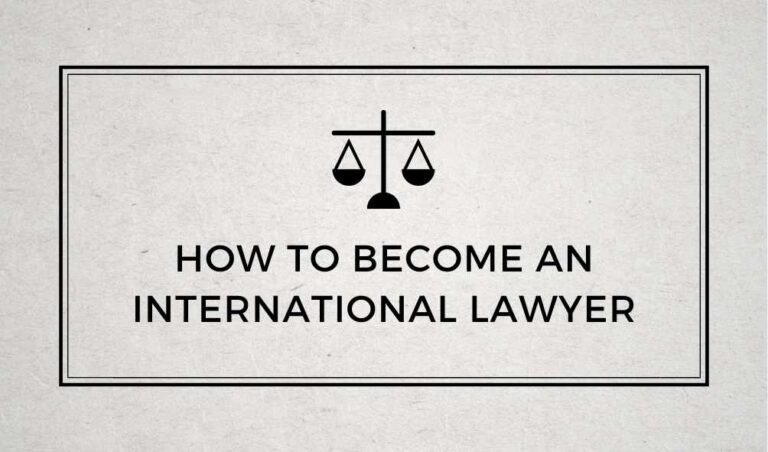How to Become a Personal Injury Lawyer?

To become a personal injury lawyer, you must earn a law degree and pass the bar exam. Additionally, gaining relevant experience through internships or working in a law firm can be beneficial.
Table of Contents
How to Become a Personal Injury Lawyer? You can specialize in personal injury law by handling cases related to accidents, medical malpractice, or product liability. This field requires strong research, communication, and negotiation skills along with empathy towards clients. Personal injury lawyers often work long hours, conducting investigations, identifying insurance coverage, and representing clients in court.
Continuous learning and staying updated with the latest laws in this field is crucial for a successful career as a personal injury lawyer.
Why Pursue A Career In Personal Injury Law?
Discover why pursuing a career in personal injury law can be rewarding and meaningful. Learn the essential steps to become a successful personal injury lawyer and make a positive impact on people’s lives through your legal expertise.
A career in personal injury law offers a variety of opportunities for advocacy and financial rewards. Personal injury lawyers play a crucial role in helping individuals who have been injured or harmed due to the negligence of others, providing them with legal representation and fighting for their rights. Let’s take a closer look at the compelling reasons why pursuing a career in personal injury law can be both fulfilling and lucrative.
Opportunities For Advocacy
One of the main reasons to pursue a career in personal injury law is the immense opportunities it offers for advocacy. As a personal injury lawyer, you have the chance to make a difference in the lives of individuals who have suffered physical, emotional, or financial harm due to someone else’s actions. Your role is to fight for their rights, ensure they receive fair compensation, and hold the responsible parties accountable.
By providing legal advice, conducting thorough investigations, and representing your clients in negotiations or courtrooms, you become their voice and advocate for justice. Your ability to navigate complex legal systems and advocate for your clients’ interests can have a profound impact on their lives, helping them achieve the justice they rightfully deserve.
Key reasons to pursue a career in personal injury law:
| Advocacy Opportunities: | Personal injury law enables you to fight for the rights of individuals who have been harmed. |
| Making a Difference: | You have the chance to make a positive impact on the lives of your clients. |
| Accountability: | You can hold responsible parties accountable for their negligence or wrongful actions. |
Financial Rewards
Aside from the opportunities for advocacy, pursuing a career in personal injury law can also offer significant financial rewards. Personal injury cases often involve substantial settlements or verdicts, allowing lawyers to earn substantial fees for their services. The financial aspect of this field can be particularly appealing, especially for those who are passionate about helping others while also securing their well-being.
While it’s true that the monetary rewards are not immediate as personal injury cases can take time to resolve, your dedication and hard work can pay off in the long run. As you build your reputation and experience, you may have the opportunity to handle high-profile cases and establish lucrative partnerships or your practice. The potential for financial stability and success in personal injury law is undoubtedly a significant motivation for many aspiring lawyers.
Key factors contributing to the financial rewards of personal injury law:
- Substantial Settlements: Personal injury cases can result in significant monetary settlements for successful lawyers.
- Fee Structure: Lawyers often work on a contingency fee basis, allowing them to earn a percentage of the compensation awarded to their clients.
- Career Advancement: By gaining experience and establishing credibility, personal injury lawyers can progress to handling higher-value cases or even starting their successful practices.

Educational Requirements For Personal Injury Lawyers
When pursuing a career as a personal injury lawyer, fulfilling the educational requirements is crucial. From obtaining a bachelor’s degree to passing the bar exam, each step plays a significant role in shaping a successful legal career. Let’s explore the path to becoming a personal injury lawyer by delving into the educational requirements.
Bachelor’s Degree
Aspiring personal injury lawyers must first obtain a bachelor’s degree. The chosen major is typically of minimal importance; however, fields related to law or pre-law studies can provide a beneficial foundation. Strong academic performance during undergraduate studies can bolster the chances of admission to reputable law schools.
Law School
Graduating from an accredited law school is imperative for individuals aspiring to become personal injury lawyers. The rigorous curriculum typically covers a broad spectrum of legal topics, including tort law, which is particularly relevant to personal injury cases. Choosing courses and clinical opportunities that focus on personal injury law can provide valuable practical experience.
Bar Exam
After completing law school, future personal injury lawyers must pass the bar exam in the state where they intend to practice. This examination assesses an individual’s understanding of legal principles and ethical standards. Successfully passing the bar exam is a pivotal step towards obtaining a license to practice law and specialize in personal injury cases.
Gaining Experience In Personal Injury Law
Gaining experience in personal injury law is essential for those interested in becoming a personal injury lawyer. This involves working in law firms, handling cases, and building knowledge in areas like negligence, liability, and damages. It’s important to pursue internships, clerkships, or entry-level positions to gain practical experience and develop skills in this field.
Internships And Clerkships
If you want to become a personal injury lawyer, gaining relevant experience in the field is essential. One way to do this is by pursuing internships and clerkships at law firms specializing in personal injury law. These opportunities provide you with hands-on experience, allowing you to observe and learn from experienced attorneys in the field.
During an internship or clerkship, you may have the chance to assist with case research, drafting legal documents, and even participating in client meetings. This practical experience will not only enhance your knowledge of personal injury law but also help you develop important skills such as legal research, writing, and client communication.
Working At Law Firms
Another avenue to gain experience in personal injury law is by working at law firms that handle personal injury cases. By joining a law firm as a legal assistant, paralegal, or junior associate, you will have the opportunity to work on real cases and further expand your understanding of personal injury law.
- Observe and learn from experienced attorneys in the firm
- Assist with case management tasks such as document organization and filing
- Conduct legal research to support ongoing cases
- Collaborate with attorneys in preparing legal documents and briefs
- Attend client meetings and hearings to gain firsthand experience
Working at a law firm exposes you to the day-to-day operations of personal injury cases, allowing you to witness the entire legal process from start to finish. Additionally, you will have the opportunity to network and build relationships with professionals in the field, opening doors for future employment and mentorship opportunities.

Credit: www.lawcrossing.com
Developing Essential Skills For Personal Injury Lawyers
Developing Essential Skills for Personal Injury Lawyers
Being a successful personal injury lawyer requires a unique set of skills to effectively represent clients and advocate for their rights. Whether you are just starting your journey into the legal field or are looking to enhance your skills as a personal injury lawyer, developing essential skills is crucial. In this article, we will explore three key skills that are vital for personal injury lawyers: strong communication skills, investigation and research abilities, and negotiation and litigation expertise.
Strong Communication Skills
The ability to communicate effectively is paramount for personal injury lawyers as they interact with clients, other attorneys, experts, and judges. It involves both verbal and written communication, as well as active listening and empathy. Personal injury lawyers must be able to clearly explain complex legal concepts to clients and provide updates on their cases in a way that is understandable and reassuring. Additionally, strong communication skills are essential when negotiating settlements or presenting cases in court. Without effective communication, it is challenging to build trust with clients and successfully advocate for their best interests.
Investigation And Research
The field of personal injury law requires a keen eye for detail and a knack for thorough investigation and research. Personal injury lawyers must gather evidence, review medical records, interview witnesses, and analyze relevant laws and regulations. By diligently conducting investigations, personal injury lawyers can uncover crucial details that strengthen their clients’ cases. Effective research skills are also essential for staying updated with legal precedent, relevant statutes, and industry trends. The ability to find and interpret information efficiently positions personal injury lawyers to provide well-informed legal advice and craft persuasive arguments.
Negotiation And Litigation
Personal injury cases often involve negotiations with insurance companies, opposing counsel, and other parties involved in the legal process. Being skilled negotiators is crucial for personal injury lawyers to secure fair settlements for their clients. These negotiations require the ability to assess the value of a case, understand the strengths and weaknesses of both sides, and advocate effectively for client interests. Moreover, personal injury lawyers must also possess strong litigation skills. This means being well-versed in court rules and procedures, confident in presenting evidence and arguments, and skilled in cross-examination. Being prepared to take a case to trial demonstrates a lawyer’s commitment to fighting for their client’s rights.
Building A Successful Personal Injury Law Practice
Establishing a flourishing personal injury law practice requires dedication, strategic planning, and ongoing effort. In this section, we’ll delve into essential aspects of building a successful personal injury law practice, including networking, marketing, branding, and continuing education.
Networking And Building Referrals
Building a robust network of contacts within the legal community and related industries is crucial for expanding your personal injury law practice. Engage in community events, legal conferences, and bar association meetings to connect with potential referral sources and colleagues. Foster relationships with medical professionals, insurance agents, and other attorneys. Referral reciprocity can significantly contribute to the growth of your practice.
Marketing And Branding
Effective marketing strategies are essential for creating a strong brand presence in the competitive personal injury law sector. Invest in a professional website, engage in search engine optimization (SEO) to improve online visibility, and utilize social media platforms to connect with potential clients. Develop a compelling brand story that resonates with your target audience. Implement content marketing by sharing valuable information through blog posts, videos, and infographics to showcase your expertise.
Continuing Education
Continuous learning and skill enhancement through continuing legal education (CLE) programs are imperative in the legal profession. Stay updated with the latest developments in personal injury law, trial techniques, and case management. Expand your expertise by attending seminars, workshops, and webinars focused on personal injury practice. Additionally, consider pursuing specialized certifications to bolster your credentials and gain a competitive edge.

Credit: ipsonlaw.com
Conclusion
In a competitive legal field, becoming a personal injury lawyer requires dedication and perseverance. By honing your communication skills, gaining experience, and staying updated with the latest laws, you can build a successful career in this challenging yet rewarding profession.
Take the first step towards your goal with determination and focus.
Introducing Jonah Plum, a legal luminary whose journey through the corridors of justice has been intertwined with the eloquence of the written word. Born and raised in the vibrant city of Seattle, Washington, Jonah's early fascination with language and debate laid the foundation for a remarkable career in law.
Jonah's scholarly odyssey began at Harvard Law School, where they immersed themselves in the study of jurisprudence, honing their analytical prowess and legal acumen. Armed with a law degree, they entered the legal arena, navigating courtrooms and boardrooms with a fervor for justice. Yet, it was the realization of the transformative power of the written word that led Jonah to pivot from legal briefs to the world of blogging.
A digital advocate in the truest sense, Jonah recognized the need for demystifying legal concepts and making them accessible to a broader audience. This blog, a virtual repository of legal insights, transcends geographical boundaries, connecting with a global readership hungry for clarity amidst legal complexities.
Beyond the black letter of the law, Jonah delves into the human stories that underscore the legal landscape. Their writing goes beyond legal analysis, weaving narratives that humanize the law, shedding light on its impact on individuals and society.






